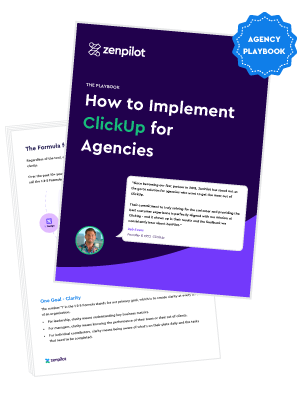5 Easy Ways Agencies Can Get Clients to Pay On Time
To chat with Gray and have ZenPilot lead your team through the last project management implementation you'll ever need, schedule a quick call here.
A struggle that every agency has gone through—or will go through—is getting your clients to pay you on time.
This seems like the classic battle of immovable object versus irresistible force. When you go through it and face this challenge, you might be asking yourself, “Is it possible to get my clients to pay me on time?”
Trying to get your clients to pay you on time can be intimidating, but it’s something that you need to strive towards through intentional strategy.
But before we dive into some actionable takeaways that you can start applying right away, let’s quickly review some reasons you definitely want to get paid on time.
Why Do You Need Your Clients to Pay on Time?
We all know that we should get paid in a timely manner, but here’s a quick recap of the main reasons you want to
1) You Have Expenses
It’s pretty obvious that internet, office, supplies, contractors, and employees won’t pay for themselves. Getting paid on time allows you to properly cover your expenses without delay.
Delayed pay can push back your payroll and bill paying, which is not something you want to happen. You need to take care of your basic business needs.
2) You’re Providing a Professional Service
This schtuff isn’t free.
You’re providing a service. When you carry out that service to the terms of your contract, you deserve proper and timely compensation according to the terms you’ve established.
Allowing Consistent Late Payments Creates Bad Habits
You are actively training your clients every step of the way on how you do business. By not enforcing on-time payments, you’re showing them that it’s OK to pay you late.
When you open to the door to this, you’ll notice clients paying later and later until one day maybe that payment doesn’t show up at all.
One key point to remember is that the longer time goes on where you don’t get paid, the harder it is to recuperate those costs.
I’ll never forget one situation early in my career when I was bootstrapping my own agency when a client gradually paid later and later until one month he didn’t pay at all. He blamed the mail. He also blamed the mail on month two and three of not paying. Regardless of what options I set out there, he came up with excuse after excuse and his invoices were totaling up.
At this point, it was so difficult to collect what was a substantial total that I had to drive almost two hours to show up at his office to receive payment and eliminate any room for excuses. Did I want to go to those lengths? No. Was it a good use of my time? Not really. Was it the most difficult way to get compensation apart from pulling teeth? Yes.
Don’t get into that situation. Enforce your payment terms!
Now that we have all that in mind, here are five actionable steps that you can take to start getting paid on time:
1) Specify Payment Terms in Your Contracts and Highlight Them During Signing
One of the most powerful assets in an agency’s arsenal is its contracts.
Stop Here
Let’s pause here a moment. If you’re not using contracts right now, then the first thing you need to pause right now and go get a template ready to use in your next client engagement.
There are plenty of resources out there right now available to help you formulate your contracts. Here a couple of places to start with:
- Docracy.com—the web’s only open collection of legal contracts and the best way to negotiate and sign documents online.
- The Anatomy of a Marketing Services Contract [eBook] via HubSpot
Word of Mouth Isn’t Enough
Contracts are the best way to solidify all of the expectations in your relationship that are discussed and agreed upon in the sales process. Word of mouth, verbal agreements, and emails aren’t enough to set the relationship off on a secure first step.
Only a formal written and signed engagement can do so.
Get Specific on Payment Times and Methods
When do payments need paid by? How should payments be received?
These are factors you need to evaluate as you think through your contracts. The more specific you can get, the better off you’ll be.
In the world of accounts receivable, there is the Net. Basically, Net followed by a number is associated with invoices and when payment for those invoices are due. So when you send out invoices with a Net 15, for example, payments are due 15 days after the invoices are received.
- We typically recommend a Net 21, although a lot of people utilize a Net 30. We’ve seen the Net 21 work well and get us paid faster. Here’s some further reading on the topic of Nets
Also, how should someone pay you? Direct bank deposit? Check? If check, then where should they mail it to and who should it be made out to?
Payment Frequencies Vary by Project
Here are a few common project types and how we handle payment for them:
- Website design and development—50% production deposit due before the project initiates and 50% due after launch.
- GamePlans (inbound marketing strategies)—50% before the engagement begins and 50% upon delivery and final presentation of the GamePlan.
- Monthly retainers—At the beginning of every month of work.
- Hourly work—Either upon completion, or if it’s a client we do a lot of hourly work a month for, we’ll send an invoice at the end of each month tallying hours and the payment that’s due.
Enforce Late Fees
If there is no penalty for late payments then what is the incentive for a client to pay on time?
Using late fees is a great way to discourage late payments. We utilize a three-percent fee with compounding interest. Here’s how it plays out:
- For a Net 21, on day 22, three percent of the invoice is taken and added to the bill. If by day 42, it is not paid, we take three percent of the latest bill (first bill + three percent) and add it to the bill.
Communicate Everything During the Contract Signing
This is key!
Adding these things into your contracts shouldn’t be a sneaky activity. Make an effort to communicate your payment terms and conditions before your client signs on the dotted line.
As I like to say, people don’t know what they don’t know. You might’ve communicated it during the sales process, but make sure it’s communicated once again and understood in this formal capacity, so be sure to take the time to do so.
2) Streamline Your Invoice Process
We’re all about process around here. Why? It saves you time and human error.
Invoices should be:
- Clear and specific—a lot of the time, your point of contact isn’t the person handling the invoice. It’s shipped off to the accounting department. The first or second invoice might be red flagged, so make sure you clearly indicate who you are and who can be reached for questions. I like to include myself and the client point of contact
- On time—if you want your clients to pay you on time, be sure to send your invoices on time. Too often, bad processes have you either forgetting to send the invoices, or fumbling to get them out on time.
- Digital—no longer do we live in a business economy where paper invoices sent via snail mail are the best option. It leaves more room for error, from printing to mailing to getting delivered by mail. Digital invoices are smoother and can be programmed to go out on schedules.
Here’s what a good invoice process looks like:
- Pre-built, branded invoice templates that can be quickly whipped up on a moment’s notice
- Pre-scheduled invoice schedules for recurring work (like monthly retainers) Make it your mission to get all of your recurring work invoices scheduled in an automatic system
Here are some good programs to use for streamlined processes:
- Wave Accounting (it’s free and awesome!)
- FreshBooks
- Quickbooks
3) Set Up Reminders
With a good software working on your behalf, you can strategically set up reminders. If you’re working with a Net 21, it’s a great business practice to remind your clients. 21 days is a lot of time for things to get forgotten, even if you’re invoicing on a regular basis.
Here’s a good automatic reminder schedule to get in place, using a Net 21 as an example:
- A reminder at day 10
- A reminder at day 3
- A reminder the day after an invoice is overdue
Also, add a link to the invoice and a way to pay you with each reminder communication.
4) Make It Easy to Pay You
The easiest ways to get paid are already what we’ve discussed—reminders and digitally received invoices that are easy to access.
You can take this to the next level though with a simple add-on—a way to pay you directly listed on the invoice. Most accounting softwares give you the option to add a pay by credit section to your invoices. This allows clients to get things taken care of right away.
Also, you may want to consider automatic credit card payments for monthly, established engagements. This takes stress of you and your clients.
5) Keep the Lines of Communication Open
Sometimes clients don’t know that an invoice hasn’t been paid. Again, your point of contact could’ve passed it to accounting and doesn’t have any control over when the checks get cut.
All it takes is a simple follow-up email or phone call to see what’s going on.
In more intense circumstances, where payments are regularly tardy or not coming altogether, you need to communicate what’s going on and why it needs to change.
If Payment Stops, Consider Halting Work
A good rule to follow is that if payment has not been received 30 days after it was do that you should consider halting operations temporarily until you figure out what’s going on.
Again, the more time that goes by, and the more work you do in the interim, the harder it’s going to be to get compensated. If two months go by and payment again hasn’t been received, then you really need to halt and figure things out.
On-Time Payments Are Important
If you want to run a scalable agency that will grow, you need to get a grip on your revenue pipelines. By establishing relationships where payments are delivered on time, you’re building a solid foundation to build your agency on.
Start Getting Paid on Time
Ready to start getting paid on time by your clients?
Schedule an operational audit with our team and let’s see how we can help.




